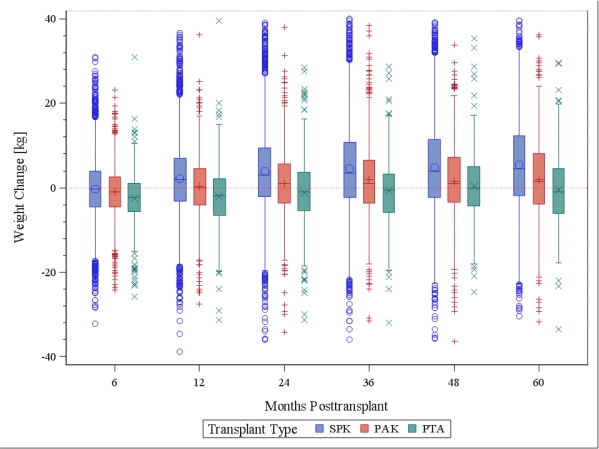Widespread Weight Gain After Pancreas Transplantation May Worsen Metabolic Graft Function.
Department of Surgery, SUNY Upstate Medical University, Syracuse, NY.
Meeting: 2016 American Transplant Congress
Abstract number: A54
Keywords: Pancreas transplantation
Session Information
Session Name: Poster Session A: Clinical Pancreas Transplantation and All Islet Cell Transplantation Topics
Session Type: Poster Session
Date: Saturday, June 11, 2016
Session Time: 5:30pm-7:30pm
 Presentation Time: 5:30pm-7:30pm
Presentation Time: 5:30pm-7:30pm
Location: Halls C&D
Introduction: Outcome after pancreas transplantation (tx) has improved over time and an increasing number of recipients remain insulin independent and enjoy a better quality of life. Long-term data is scarce with regard to metabolic state and function. In fact, some recipients with long time graft function show diminished metabolic control despite excellent c-peptide levels. This specific group of recipients may require conservative diabetes treatment or even resumption of some insulin administration. In order to analyze some aspects of the metabolic state, we studied posttx weight changes in pancreas transplant recipients.
Methods: 9,434 technically successful pancreas txs that were performed between 2005 and 2013 were analyzed. Most patients received a SPK (78%) followed by PAK (14%) and PTA (8%); 94% of the recipients had been transplanted for type 1 DM. Steroids were used in 66% for maintenance therapy. Generalized mixed models were used to analyze the weight changes and impact of risk factors.
Results: A significant change in average weight was noted over time. Figure 1  shows the change for recipient category. After an initial slight weight decease at 6 months posttx, a constant increase in average weight was observed (p<0.0001). The highest weight gain was found in former type 2 patients (p< 0.0001). The weight gain over time was highest in SPK compared to solitary transplant recipients (p=0.002) and lower for PTA vs. PAK recipients (p<0.0001). Former type 1 diabetic recipients < 45 yrs at the time Tx gained slightly less weight than those >45 yrs. The use of steroids resulted in significantly higher weight gain.
shows the change for recipient category. After an initial slight weight decease at 6 months posttx, a constant increase in average weight was observed (p<0.0001). The highest weight gain was found in former type 2 patients (p< 0.0001). The weight gain over time was highest in SPK compared to solitary transplant recipients (p=0.002) and lower for PTA vs. PAK recipients (p<0.0001). Former type 1 diabetic recipients < 45 yrs at the time Tx gained slightly less weight than those >45 yrs. The use of steroids resulted in significantly higher weight gain.
Conclusion: An increase in average recipient weight is observed over time after pancreas tx. The weight increase is most pronounced in SPK recipients, former type 2 diabetics, patients >45yrs at the time of Tx, and recipients on steroid maintenance therapy. Based on our results, it seems crucial to educate patients about the possibility of unintended posttx weight gain and worsening metabolic and diminished graft function including the risk of developing type 2 diabetes. A focus on dietary measures is warranted.
CITATION INFORMATION: Gruessner A, Whittaker V, Ozden N, Gruessner R. Widespread Weight Gain After Pancreas Transplantation May Worsen Metabolic Graft Function. Am J Transplant. 2016;16 (suppl 3).
To cite this abstract in AMA style:
Gruessner A, Whittaker V, Ozden N, Gruessner R. Widespread Weight Gain After Pancreas Transplantation May Worsen Metabolic Graft Function. [abstract]. Am J Transplant. 2016; 16 (suppl 3). https://atcmeetingabstracts.com/abstract/widespread-weight-gain-after-pancreas-transplantation-may-worsen-metabolic-graft-function/. Accessed February 9, 2026.« Back to 2016 American Transplant Congress
